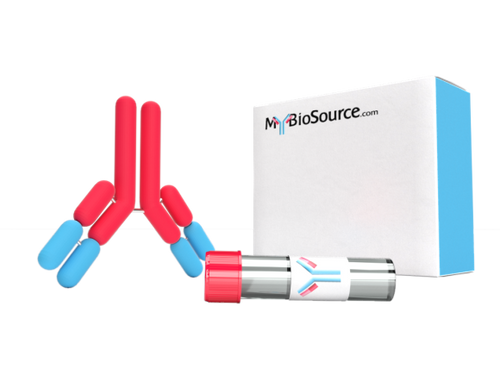Product Description
anti- MSH6 antibody is available at Gentaur for Next week Delivery.
Purification: Protein A+G purification
Background: Component of the post-replicative DNA mismatch repair system(MMR). Heterodimerizes with MSH2 to form MutS alpha, which binds to DNA mismatches thereby initiating DNA repair. When bound, MutS alpha bends the DNA helix and shields approximately 20 base pairs, and recognizes single base mismatches and dinucleotide insertion-deletion loops(IDL) in the DNA. After mismatch binding, forms a ternary complex with the MutL alpha heterodimer, which is thought to be responsible for directing the downstream MMR events, including strand discrimination, excision, and resynthesis. ATP binding and hydrolysis play a pivotal role in mismatch repair functions. The ATPase activity associated with MutS alpha regulates binding similar to a molecular switch: mismatched DNA provokes ADP-->ATP exchange, resulting in a discernible conformational transition that converts MutS alpha into a sliding clamp capable of hydrolysis-independent diffusion along the DNA backbone. This transition is crucial for mismatch repair. MutS alpha may also play a role in DNA homologous recombination repair. Recruited on chromatin in G1 and early S phase via its PWWP domain that specifically binds trimethylated 'Lys-36' of histone H3(H3K36me3): early recruitment to chromatin to be replicated allowing a quick identification of mismatch repair to initiate the DNA mismatch repair reaction..
Immunogen: mutS homolog 6
Synonyms: G/T mismatch binding protein, GTBP, GTMBP, hMSH6, HNPCC5, HSAP, MSH6, MutS alpha 160 kDa subunit, mutS homolog 6 (E. coli), p160
Reactivity: Human
Tested Application: ELISA, WB, IHC, IP
Recommended dilution: WB: 1:500-1:2000; IP: 1:500-1:1000; IHC: 1:50-1:200
Image 1: Immunohistochemistry of paraffin-embedded human colon cancer tissue slide using FNab05376(MSH6 Antibody) at dilution of 1:100
Image 2: .
Image 3:
Image 4: HEK-293 cells were subjected to SDS PAGE followed by western blot with FNab05376(MSH6 Antibody) at dilution of 1:1000
Gene ID: 2956
Research Area: Metabolism
Uniprot ID: P52701
 Euro
Euro
 British Pound
British Pound
 US Dollar
US Dollar











